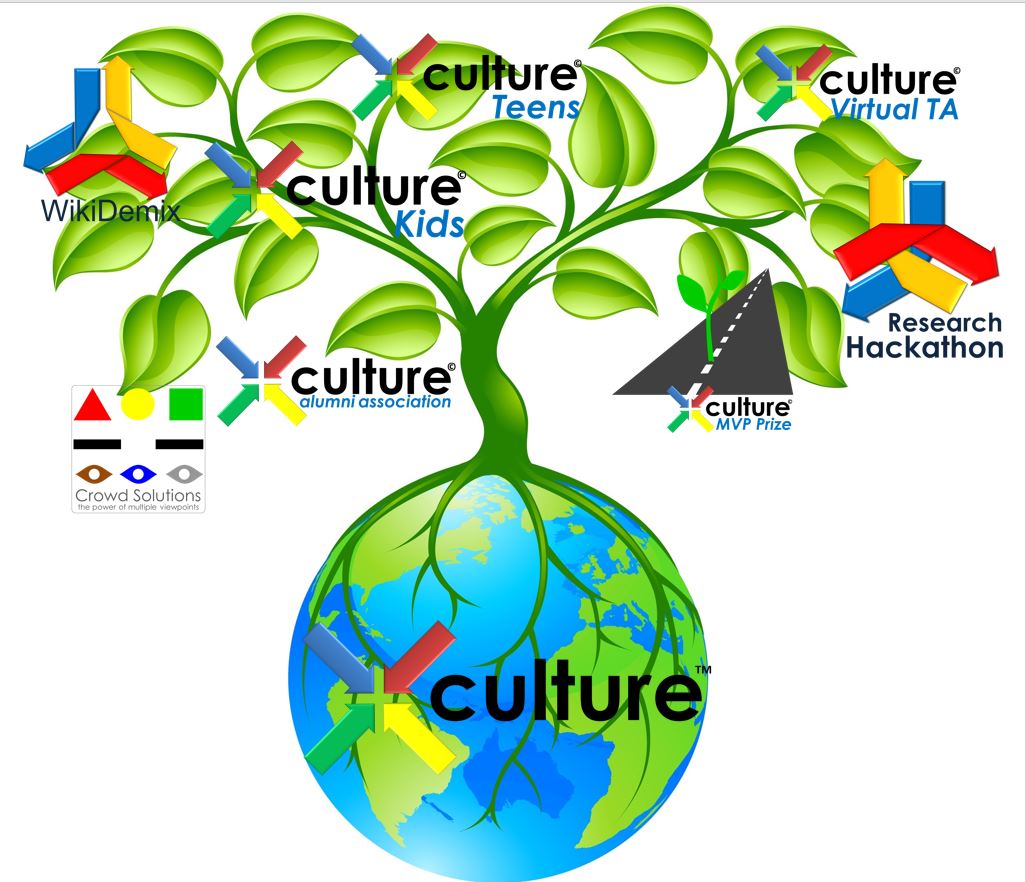
Roads? Where we’re going we don’t need roads.
by Vas Taras
Open-source collaboration and crowd sourcing – the principles at heart of X-Culture – have already changed a number of industries.
Conspicuously, however, business research, education, and consulting are stuck in the “do it in the house” paradigm. We think we can change that.
It would make sense to first share how X-Culture started. It’s a fascinating story of serendipity and hard work. However, history can wait. I’d like to start by sharing our plans for the nearest future.
And no, I am not afraid to opening reveal our new program/service/product plans. Our goal is to make a world a better place by connecting cultures and providing platforms for collaborating learning, research, and business consulting. If somebody takes our ideas and does it better, it’ll mean less work for us.
So, here are the new directions we are exploring.
Since all of these are essentially risky start-up ideas, your feedback, warnings, and criticism are most welcome. And if you find some of these particularly interesting and you’d like to get involved, by all means, please let me know.
A more detailed description of each program to be shared soon. For now, a quick list:
X-Culture Alumni Association: Over 35,000 students have gone through X-Culture. When asked how educational and useful for your future career was the X-Culture experience, about 89% of them said “extremely useful”, 6% said “very useful”* Many of them inquired about a possibility of staying in touch and continuing benefiting and learning through X-Culture. So in 2016 we created the X-Culture Alumni Association. Tim van der Meijde of the Netherlands/Germany emerged as a leader of that movement and is developing that program.
X-Culture Coaching Program: At the end of each semester, some students would inquire about a possibility of much closer continued involvement. The Alumni Association is not enough for them. They want more. So we started offering them to serve as X-Culture Coaches to the new generation of students. The program was pilot-tested in 2016 and went full-scale in 2017. Students whose performance was excellent in the past can apply for and go through a rigorous theoretical training that covers 12 topics, such as team dynamics, cross-cultural communication, cross-cultural conflict resolution, online collaboration tools, effective feedback giving, academic writing, plagiarism, team counseling, and the like. Then they take a Theory Test and if they pass, they get three months of practical training in GVT coaching. They help teams with their challenges, resolving conflicts, provide feedback on team work, prepare webinars, and more. In the end, they do another test and write a paper – and if pass, receive the X-Culture GVT certificates.
Virtual TA: Every semester I get dozens, in fact sometimes hundreds, emails from students around the world who say something like this: “Professor, I participated in X-Culture and learned a lot. I like international business and want to apply to a graduate program in IB soon. Can I work with you as your TA or RA for a few semesters to gain some research and academic experience? This will also strengthen my resume and maybe you’ll give me a reference letter when the time comes for me to apply to the Ph.D. program? I don’t want any more, just need the experience and your mentorship.” I work with students like this all the time, but how many can I use… At the same time, every professor can use some help like this and most can offer quality mentorship and guidance. Hey, many would even be happy to pay for occasional ad-hoc help. So we want to create a platform where students can offer their help and professors can offer their experience, mentorship, and reference letters. Sort of Airbnb for TAs/RAs, complete with quality ratings, feedback and more. There will be a day when it will be expected to provide your Virtual TA rating when applying to Ph.D. programs. Mark my words J
X-Culture Kids: The idea for a kids’ version of X-Culture has been around for a long time. In 2016, Olga Zvereva of Latvia finally pulled that program in existence. This semester we’re testing the program with a small group of X-Culture Teens (ages 13-17). If successful, we’ll go full-scale in the fall 2017. Eventually, we’d like to have offer X-Culture to kids ages 8 and older, and maybe even younger. It will be just like a regular X-Culture competition, but with a slightly simpler task and shorter. But the main idea will remain the same: kids work with their peers from other countries and together develop a solution to a business (or social) problem. Not only teachers with their classes or individual kids can enroll in the X-Culture Kids program.
WikiDemix: This one is probably the most important program of them all, with the potential to change how research is done in International Business first, and other fields later. It is disgrace that we, the academics, still operate as if it’s the last-century; guard our data and focusing on publishing, not on knowledge creation. The paradox of not sharing your data and not open-sourcing the research process is that you actually can publish more (and lower your chances of perishing) by openly sharing your data. And you can definitely create more and better knowledge by opening your data and crowdsourcing your research. The problem is that those few (or actually many!) who see value in sharing their data have no place to publish the data. Well, we’re trying to provide such platform where one can publish one’s data (complete with a proper APA reference and all) – and will start by sharing our own dataset of over 2,000 variables and tens of thousands of cases. The platform is now fully functional as far as the technical side, we’re just readying up our own data for sharing. Should be no more than a few more weeks before the platform goes live. Here a short intro video: http://wikidemix.org/ I don’t know if it will be WikiDemix.org, but the time will soon come that in IB, like in medical sciences and physics, all serious journals will require that the data be published before the paper appears in print.
X-Culture Hackathon: Not only do we have a humongous database of our own, but we also have over 100 datasets shared with us by our colleagues (long story why they sent me their data – will tell in more detail soon). Plus we expect hundreds or even thousands of more datasets to be published on www.WikiDemix.org soon. The idea is to regularly bring together people interested in using our data for research and run what programmers call a “hackathon”. Several days of intensive data mining and paper development. Day 1: Intros and paper brainstorming. Day 2: Presentation and discussion of more promising ideas, forming co-author teams, running initial tests. Day 3: Presentation of initial results, feedback, refinement. Day 4: Write up of the main points that will go into the paper, presentation, feedback. The goal is to spend the same time/money as you would spend on a regular conference, but instead of running from a session to a session, nametag hunting, and going home with a bunch of business card, you’ll spend these several days intensively developing papers and go home with paper idea, co-author(s), initial results, feedback and paper outline. You then will spend a few more months polishing the paper and submitting it to a journal. Boom! More here: http://x-culture.org/hackathon/
MPV Prize: Just like X-Culture, but the task is not a market expansion strategy for an existing company, but a startup. And the prize is not a certificate, but cash to create a minimum viable product. Participation does not have to be team-based. Individuals are welcome to bring their start-up ideas and work on them individually. The key here is that our process will be much more than a contest of best startup ideas. Not a contest. A multi-stage collaborative co-creation designed to allow the crowd to advance far beyond the ideas that any individual member of the crowd could have come up with on her own. There will be still a winner who will get the resources to build a minimum viable product and turn it into a thriving business. But even those who won’t win the prize will still gain a lot in the process, including experience, contacts, and more refined startup idea. More on the principles and process here: https://www.youtube.com/watch?v=DfNUz2qlQkY. And yes, the idea is that X-Culture will get to retain a share of the start-up, so there is a potential here for us to finally start making some money.
Crowd Solutions: The biggest challenge with platform business is attracting the initial crowd. Nobody wants a telephone while there is only one telephone in the world. But once there are many telephones in the world, the more there are, the more valuable it becomes to join the network. One huge advantage X-Culture has is that we have the initial crowd. We have tens of thousands of students (and alumni), hundreds of professors, and tens of thousands of followers on Facebook. X-Culture doesn’t have to be limited only to students who are lucky to take an IB course that X-Culture is part of and half a dozen companies we carefully select and allow to post their business challenges. The idea is to create a platform where anyone can post a business challenge any time and anyone can sign up to solve that challenge any time. Think www.Innocentive.com, but with a much better process. Innocentive is using a stone-age process. It’s basically a contest, a free-lancer platform at best. There is no co-creation, no collaboration, no idea exchange. We have been testing models of crowdsourcing for complex problem solving and our results show we can do much better.
God give us energy to implement all this ideas. We can use any help we can get.
* Full disclosure, while 95% are very or extremely happy, 3% said “somewhat useful”, 2% said “not very useful” and about 15 students, or 0.3% said “completely useless”. There are always a few, a few small number, but still a few who seem to be unhappy.
Disclaimer: This and all other blog posts by Vas Taras are deliberately not checked for grammar and wording. No time to waste on that.
But if you see any typos or poor wording, please let me know and I’ll correct. Crowdsourcing grammar 😉
By Vas Taras
Become an X-Culture Blogger and submit your X-Culture related observations, stories, suggestions





This is simply an amazing project, I am so proud of being part of it!
An amazing project only because of people like you, Alfredo! Wouldn’t be possible without you, and I hope you know it.
Amazing! it’s works!